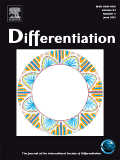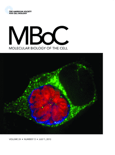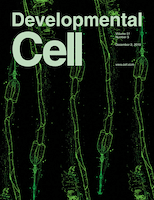
DIFFERENTIATION
Scope & Guideline
Illuminating the Pathways of Molecular Processes
Introduction
Aims and Scopes
- Cellular Differentiation Mechanisms:
The journal emphasizes the molecular signaling pathways and genetic factors that drive cellular differentiation, including studies on growth factors, signaling molecules, and transcription factors. - Developmental Biology:
A core area of focus is developmental biology, examining the processes that occur during embryogenesis and organogenesis, with particular attention to how cells and tissues develop and differentiate. - Stem Cell Research:
The journal publishes significant research on stem cells, including their differentiation potential, mechanisms of pluripotency, and applications in regenerative medicine. - Model Organisms:
Research utilizing model organisms such as zebrafish, mouse, and human pluripotent stem cells is a consistent theme, providing insights into differentiation processes that can be extrapolated to human biology. - Epigenetics and Differentiation:
The role of epigenetic modifications in regulating gene expression during differentiation is a focal point, with studies exploring how these changes influence cellular fate. - Pathological Implications of Differentiation:
The journal also addresses the pathological aspects of differentiation, including how aberrations in normal differentiation processes can lead to diseases such as cancer or developmental disorders.
Trending and Emerging
- Fibroblast Growth Factors (FGFs):
There is a growing emphasis on fibroblast growth factors, with numerous recent papers dedicated to understanding their roles in development, signaling pathways, and therapeutic potentials. - Stem Cell Differentiation Pathways:
Research increasingly focuses on specific pathways that regulate stem cell differentiation, including the influence of non-coding RNAs and epigenetic factors, highlighting their critical roles in lineage specification. - Organoid and 3D Culture Systems:
Emerging studies are utilizing organoid technology and 3D culture systems to better mimic in vivo conditions, allowing for more accurate modeling of differentiation processes and disease mechanisms. - Mechanobiology in Differentiation:
The intersection of mechanical forces and cellular differentiation is gaining traction, with studies exploring how biomechanical cues influence cell fate decisions. - Systems Biology Approaches:
A trend towards systems biology approaches is evident, where researchers are employing network analysis and transcriptomic data to uncover complex interactions involved in differentiation.
Declining or Waning
- Hormonal Regulation of Differentiation:
Although hormonal influences on differentiation were previously a significant focus, recent publications indicate a decrease in studies exploring the effects of hormones, particularly estrogens, on developmental processes. - Gene Manipulation Techniques:
There has been a noticeable reduction in the exploration of traditional gene manipulation techniques in favor of more advanced methodologies such as CRISPR and other genome editing technologies. - In Vitro Models of Differentiation:
Research utilizing standard in vitro models for studying differentiation has decreased, as there is a shift towards more complex and physiologically relevant systems, such as organoids and 3D cultures. - Comparative Developmental Studies:
The comparative analysis of developmental processes across different species has become less frequent, as the focus shifts more towards human-specific studies and translational research.
Similar Journals

DEVELOPMENTAL BIOLOGY
Unraveling the Mysteries of Life's Building BlocksDEVELOPMENTAL BIOLOGY, published by Academic Press Inc., Elsevier Science, stands as a pivotal journal in the fields of cell biology, developmental biology, and molecular biology since its inception in 1959. Renowned for its rigorous peer-review process, this journal serves as a platform for publishing cutting-edge research, reviews, and insights that drive forward our understanding of developmental processes at the cellular and molecular levels. With an impressive track record, it is classified in the Q2 quartile across multiple categories, reflecting its significant impact and relevance in academia and research communities. Although the journal does not provide Open Access options, it remains accessible via numerous academic databases, ensuring a wide reach for researchers, professionals, and students alike. With a commitment to advancing the field, DEVELOPMENTAL BIOLOGY continues to be essential reading for those looking to stay at the forefront of developmental research and its applications.

CELL RESEARCH
Illuminating the Pathways of Life SciencesCELL RESEARCH is a premier peer-reviewed journal dedicated to advancing the field of cell biology and molecular biology, published by SpringerNature. With an impressive impact factor and consistently ranking in the Q1 quartile for both cell biology and molecular biology, this journal serves as a pivotal resource for researchers, professionals, and students seeking to explore the latest discoveries and advancements in cellular mechanisms and their implications for health and disease. Since its inception in 1996, CELL RESEARCH has cultivated a distinguished reputation, currently boasting ranks in the top percentile of Scopus categories, reaffirming its influence and relevance to the scientific community. Although it is not an Open Access journal, its rigorous selection process ensures the publication of high-quality articles that contribute significantly to our understanding of life sciences. For those deeply engaged in the realms of biochemistry, genetics, and molecular biology, CELL RESEARCH is an essential conduit of innovative research and critical insights.

MOLECULAR BIOLOGY OF THE CELL
Connecting Discoveries in Molecular and Cellular ScienceMOLECULAR BIOLOGY OF THE CELL is a prestigious journal published by the American Society for Cell Biology, focusing on the latest advancements in cell biology and molecular biology. Established in 1990, this journal serves as a vital forum for disseminating innovative research, methodologies, and insights that drive the understanding of cellular processes and their implications in health and disease. With a noteworthy impact factor and recognition within the top quartiles for both Cell Biology and Molecular Biology, it ranks prominently among its peers, with Scopus rankings reflecting its significance in the scientific community. Although the journal does not follow an open access model, it provides essential access options for both institutional and personal subscriptions. Researchers, professionals, and students seeking to expand their knowledge and collaborate on groundbreaking findings will find MOLECULAR BIOLOGY OF THE CELL an invaluable resource in the field.

DEVELOPMENTAL CELL
Connecting Researchers with Cutting-Edge ScienceDEVELOPMENTAL CELL, published by CELL PRESS, stands as a premier journal in the fields of Biochemistry, Genetics and Molecular Biology, Cell Biology, and Developmental Biology. With a significant influence evidenced by its Q1 rankings across several categories in 2023 and a remarkable Scopus ranking placing it at the 98th percentile for Developmental Biology, this journal is pivotal for researchers and academics aiming to advance their understanding of cellular processes. Covering a broad range of topics from molecular mechanisms to cellular developmental pathways, DEVELOPMENTAL CELL publishes cutting-edge research articles that contribute to the dynamic landscape of cell biology and related disciplines. Although it does not currently offer open access, the journal is accessible through institutional subscriptions, reinforcing its commitment to disseminating high-quality scientific knowledge produced by leading experts in the field. Based in the United States, DEVELOPMENTAL CELL continues to push the boundaries of discovery and innovation in life sciences, making it an essential resource for professionals, researchers, and students alike in the quest for foundational biological insights.

Cell Discovery
Exploring the Depths of Biochemistry and GeneticsCell Discovery, published by SPRINGERNATURE, is a premier open access journal in the dynamic fields of Biochemistry, Cell Biology, Genetics, and Molecular Biology. Since its inception in 2015, this journal has established itself as a key platform for disseminating high-impact research and is recognized with a Q1 ranking across all its core categories for the year 2023. With its remarkable Scopus rankings—7th in Genetics, 9th in Biochemistry, 13th in Molecular Biology, and 15th in Cell Biology—Cell Discovery positions itself among the elite journals in life sciences, showcasing the most innovative breakthroughs and comprehensive reviews. Based in the United Kingdom, this journal operates under an open access model, ensuring that groundbreaking discoveries are readily available to researchers, professionals, and students around the globe. With a commitment to advancing scientific knowledge, Cell Discovery welcomes contributions that push the frontiers of our understanding in cellular and genetic sciences.

CYTOTECHNOLOGY
Exploring Cytotechnological Frontiers: Where Research Meets Application.CYTOTECHNOLOGY, an esteemed journal published by Springer, stands as a vital resource in the fields of Bioengineering, Biomedical Engineering, and Biotechnology. With an impact factor reflective of its solid position within academia, this journal encompasses a broad scope dedicated to the advancement of cytotechnological research and applications from its inception in 1987 through to its latest volumes in 2024. Based in the Netherlands, it is committed to providing researchers, professionals, and students with high-quality, peer-reviewed articles that contribute to the understanding and innovations in cytotechnology. Although currently not open access, CYTOTECHNOLOGY has garnered a commendable reputation, holding Q3 rankings in multiple categories, indicating its relevance and influence within the scientific community. Researchers are encouraged to submit their cutting-edge findings to share insights that can spark further advancements in this dynamic field.

Cells & Development
Innovating Insights into Cellular MechanismsCells & Development is a premier journal published by Elsevier, dedicated to advancing the field of Developmental Biology. With an ISSN of 2667-2901 and an impressive Q2 ranking in its category for 2023, the journal endeavors to provide a platform for high-quality research articles that explore cellular mechanisms, developmental processes, and molecular interactions that underpin growth and differentiation. Based in the Netherlands, Cells & Development not only emphasizes the importance of innovative experimental approaches but also encourages interdisciplinary contributions that bridge the gap between basic and applied science. As an Open Access publication, it ensures that research findings are readily accessible to a global audience, significantly enhancing visibility and impact. The journal's commitment to scholarly excellence makes it an essential resource for researchers, professionals, and students aiming to contribute to the dynamic field of developmental biology.

Russian Journal of Developmental Biology
Diving deep into the dynamics of development.The Russian Journal of Developmental Biology, published by PLEIADES PUBLISHING INC, serves as a significant platform for researchers and professionals engaged in the field of developmental biology. With the ISSN 1062-3604 and E-ISSN 1608-3326, this journal focused on intricate biological processes and dynamic developmental mechanisms from 2005 until 2017. Although its coverage is currently discontinued in Scopus, it remains notable for its contribution to understanding the pivotal roles of biochemistry and molecular genetics within the context of development. As a publication situated in the competitive quartiles of the field and boasting an influential Scopus rank of #77 out of #78, it has made a unique mark in developmental studies. Researchers and academics seeking to enhance their knowledge of historical advancements in the discipline will find the journal a valuable resource, even as it navigates the transition away from active publication.

Animal Cells and Systems
Unlocking the Secrets of Cellular Systems in AnimalsAnimal Cells and Systems, published by TAYLOR & FRANCIS LTD, is a prominent open-access journal that has been disseminating high-quality research since 2017. With an ISSN of 1976-8354 and an E-ISSN of 2151-2485, this journal is dedicated to advancing the understanding of animal cellular biology and the intricate systems that govern organismal functions. Recognized for its rigorous peer-review process, it holds an esteemed position in the academic community, boasting a Q1 ranking in Animal Science and Zoology and a Q2 ranking in Biochemistry, Genetics and Molecular Biology for 2023. The journal is indexed in Scopus, ranked #79/490 in Animal Science and Zoology and #85/221 in General Biochemistry, Genetics, and Molecular Biology, affirming its impact and relevance in these fields. With a commitment to providing researchers, professionals, and students with vital insights and cutting-edge research, Animal Cells and Systems is an essential resource for those looking to explore the complex landscapes of animal biology.

BMC Molecular and Cell Biology
Fostering collaboration in the realm of molecular and cell science.BMC Molecular and Cell Biology is a forward-thinking open-access journal published by BMC, specializing in the vital fields of molecular biology and cell biology. Since its inception in 2019, the journal has carved a niche for itself, ranking in the Q3 quartile in both Cell Biology and Molecular Biology categories as of 2023. With an ISSN of N/A and an E-ISSN of 2661-8850, the journal provides a platform for groundbreaking research, high-quality reviews, and innovative methodologies. Situated in the United Kingdom, BMC Molecular and Cell Biology promotes a diverse range of studies, addressing fundamental questions in biology that resonate with both experts and new researchers alike. The journal's commitment to open access ensures that valuable findings are readily available to the global scientific community, fostering collaboration and knowledge-sharing across disciplines. Researchers aiming to contribute to the field of cell and molecular biology will find this journal an indispensable resource for both publishing and staying informed on the latest advances.